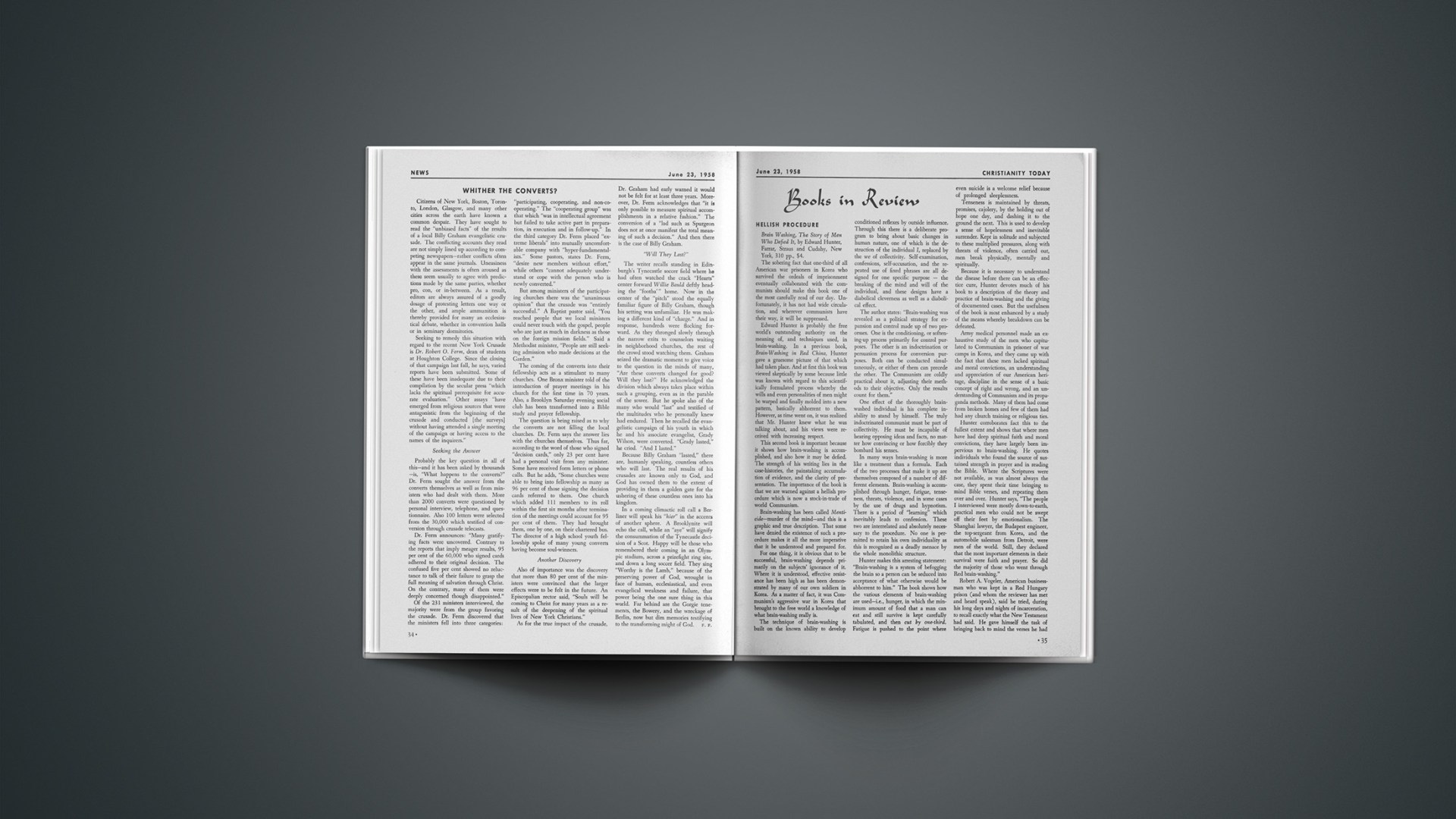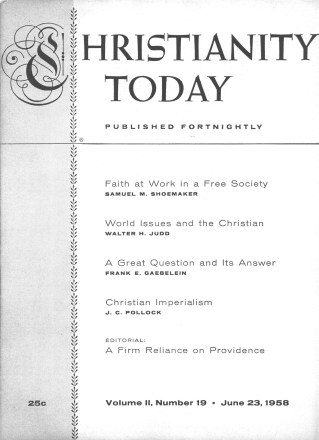Citizens of New York, Boston, Toronto, London, Glasgow, and many other cities across the earth have known a common despair. They have sought to read the “unbiased facts” of the results of a local Billy Graham evangelistic crusade. The conflicting accounts they read are not simply lined up according to competing newspapers—rather conflicts often appear in the same journals. Uneasiness with the assessments is often aroused as these seem usually to agree with predictions made by the same parties, whether pro, con, or in-between. As a result, editors are always assured of a goodly dosage of protesting letters one way or the other, and ample ammunition is thereby provided for many an ecclesiastical debate, whether in convention halls or in seminary dormitories.
Seeking to remedy this situation with regard to the recent New York Crusade is Dr. Robert O. Ferm, dean of students at Houghton College. Since the closing of that campaign last fall, he says, varied reports have been submitted. Some of these have been inadequate due to their compilation by the secular press “which lacks the spiritual prerequisite for accurate evaluation.” Other assays “have emerged from religious sources that were antagonistic from the beginning of the crusade and conducted [the surveys] without having attended a single meeting of the campaign or having access to the names of the inquirers.”
Seeking The Answer
Probably the key question in all of this—and it has been asked by thousands—is, “What happens to the converts?” Dr. Ferm sought the answer from the converts themselves as well as from ministers who had dealt with them. More than 2000 converts were questioned by personal interview, telephone, and questionnaire. Also 100 letters were selected from the 30,000 which testified of conversion through crusade telecasts.
Dr. Ferm announces: “Many gratifying facts were uncovered. Contrary to the reports that imply meager results, 95 per cent of the 60,000 who signed cards adhered to their original decision. The confused five per cent showed no reluctance to talk of their failure to grasp the full meaning of salvation through Christ. On the contrary, many of them were deeply concerned though disappointed.”
Of the 231 ministers interviewed, the majority were from the group favoring the crusade. Dr. Ferm discovered that the ministers fell into three categories: “participating, cooperating, and non-cooperating.” The “cooperating group” was that which “was in intellectual agreement but failed to take active part in preparation, in execution and in follow-up.” In the third category Dr. Ferm placed “extreme liberals” into mutually uncomfortable company with “hyper-fundamentalists.” Some pastors, states Dr. Ferm, “desire new members without effort,” while others “cannot adequately understand or cope with the person who is newly converted.”
But among ministers of the participating churches there was the “unanimous opinion” that the crusade was “entirely successful.” A Baptist pastor said, “You reached people that we local ministers could never touch with the gospel, people who are just as much in darkness as those on the foreign mission fields.” Said a Methodist minister, “People are still seeking admission who made decisions at the Garden.”
The coming of the converts into their fellowship acts as a stimulant to many churches. One Bronx minister told of the introduction of prayer meetings in his church for the first time in 70 years. Also, a Brooklyn Saturday evening social club has been transformed into a Bible study and prayer fellowship.
The question is being raised as to why the converts are not filling the local churches. Dr. Ferm says the answer lies with the churches themselves. Thus far, according to the word of those who signed “decision cards,” only 23 per cent have had a personal visit from any minister. Some have received form letters or phone calls. But he adds, “Some churches were able to bring into fellowship as many as 96 per cent of those signing the decision cards referred to them. One church which added 111 members to its roll within the first six months after termination of the meetings could account for 95 per cent of them. They had brought them, one by one, on their chartered bus. The director of a high school youth fellowship spoke of many young converts having become soul-winners.
Another Discovery
Also of importance was the discovery that more than 80 per cent of the ministers were convinced that the larger effects were to be felt in the future. An Episcopalian rector said, “Souls will be coming to Christ for many years as a result of the deepening of the spiritual lives of New York Christians.”
As for the true impact of the crusade, Dr. Graham had early warned it would not be felt for at least three years. Moreover, Dr. Ferm acknowledges that “it is only possible to measure spiritual accomplishments in a relative fashion.” The conversion of a “lad such as Spurgeon does not at once manifest the total meaning of such a decision.” And then there is the case of Billy Graham.
“Will They Last?”
The writer recalls standing in Edinburgh’s Tynecastle soccer field where he had often watched the crack “Hearts” center forward Willie Bauld deftly heading the “footba’ ” home. Now in the center of the “pitch” stood the equally familiar figure of Billy Graham, though his setting was unfamiliar. He was making a different kind of “charge.” And in response, hundreds were flocking forward. As they thronged slowly through the narrow exits to counselors waiting in neighborhood churches, the rest of the crowd stood watching them. Graham seized the dramatic moment to give voice to the question in the minds of many, “Are these converts changed for good? Will they last?” He acknowledged the division which always takes place within such a grouping, even as in the parable of the sower. But he spoke also of the many who would “last” and testified of the multitudes who he personally knew had endured. Then he recalled the evangelistic campaign of his youth in which he and his associate evangelist, Grady Wilson, were converted. “Grady lasted,” he cried. “And I lasted.”
Because Billy Graham “lasted,” there are, humanly speaking, countless others who will last. The real results of his crusades are known only to God, and God has owned them to the extent of providing in them a golden gate for the ushering of these countless ones into his kingdom.
In a coming climactic roll call a Berliner will speak his “hier” in the accents of another sphere. A Brooklynite will echo the call, while an “aye” will signify the consummation of the Tynecastle decision of a Scot. Happy will be those who remembered their coming in an Olympic stadium, across a prizefight ring site, and down a long soccer field. They sing “Worthy is the Lamb,” because of the preserving power of God, wrought in face of human, ecclesiastical, and even evangelical weakness and failure, that power being the one sure thing in this world. Far behind are the Gorgie tenements, the Bowery, and the wreckage of Berlin, now but dim memories testifying to the transforming might of God.
F.F.










